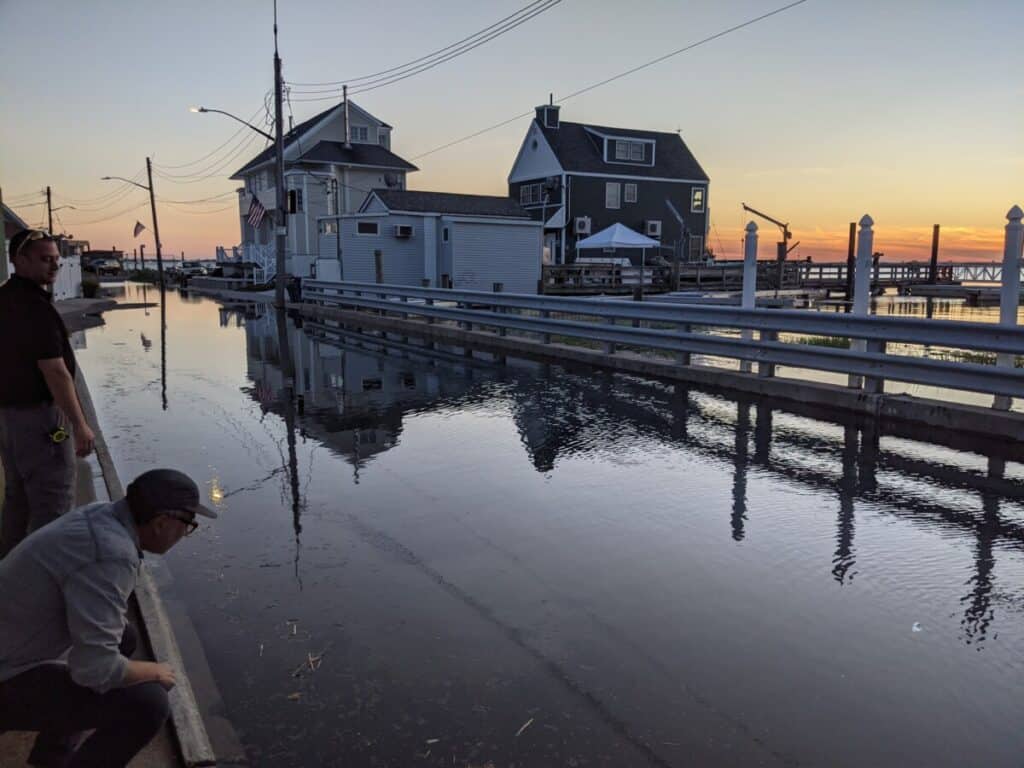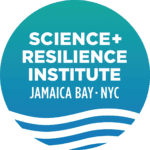The latest report by the Intergovernmental Panel on Climate Change (IPCC), released March 2022, is a clarion call for cities, states and nations to move swiftly to reduce greenhouse gas emissions and to adapt to a changing climate. This is particularly important for urban estuaries, such as Jamaica Bay, where climate change is exacerbating already existing problems caused by urbanization, overdevelopment, shrinking biodiversity, and rising sea levels.
The Science and Resilience Institute at Jamaica Bay (SRIJB) serves as a bridge between researchers and communities to provide information and to gather data about the socioecological effects of climate change on Jamaica Bay.

“Climate change is a threat to human well-being and planetary health. Any further delay in concerted anticipatory global action on adaptation and mitigation will miss a brief and rapidly closing window of opportunity to secure a livable and sustainable future for all,” the IPCC report states in its conclusion.
The report draws a clear line in the sand at 1.5 degrees above pre-industrial temperatures between what’s possible through adaptation/mitigation and what will become increasingly more difficult if we surpass that milestone. We’re swiftly nearing it, researchers say, especially if we continue to emit greenhouse gases at current levels (or above) and don’t take bold action to wean our economies off fossil fuels.
“Biodiversity loss, and degradation, damages to and transformation of ecosystems are already key risks for every region due to past global warming and will continue to escalate with every increment of global warming,” the report says.
Climate change and warming temperatures have already irreversibly altered the Earth’s terrestrial, freshwater, coastal and ocean marine ecosystems, the report states. “Approximately half of the species assessed globally have shifted polewards or, on land, also to higher elevations. Hundreds of local losses of species have been driven by increases in the magnitude of heat extremes, as well as mass mortality events on land and in the ocean….” The changes have wrought adverse socioeconomic consequences, with the poorest being hit hardest, the IPCC report says. It estimates that 3.3 billion to 3.6 billion people currently live in situations that are vulnerable to climate change-induced food insecurity, droughts, flooding, and water scarcity.
Cities already are being harmed by climate-changed induced health issues (including mental health), heatwaves, interruptions in infrastructure functions, sea-level rise, and air pollution events. “Observed impacts are concentrated amongst (sic) the economically and socially marginalized urban residents…,” the report says. And matters have worsened since the last report a decade ago, it adds. “(T)here is increasing evidence that degradation and destruction of ecosystems by humans increases the vulnerability of people.”
The report offers some hope, however. It says that “adaptation planning and implementation have continued to increase across all regions.” Ecosystem-based Adaptation (EbA), such as Nature-based Solutions, “reduces a range of climate change risks to people, biodiversity and ecosystem services with multiple co-benefits.” The SRIJB has helped develop and pilot a standardized framework to monitor shoreline features across all coastal regions of New York State to gather data and help determine how nature-based solutions can help New York City adapt to climate change.
The impact of future climate change risks, even if we manage to stay at or below a 1.5◦C rise above preindustrial temps, must be factored into the planning and implementation of adaptation strategies, the report says. “Climate resilient development is already challenging at current global warming levels. The prospects for climate resilient development will be further limited if global warming levels exceed 1.5◦C and not be possible in some regions and subregions if the global warming level exceeds 2◦C.
This IPCC report is the second part of the Sixth Assessment Report, Climate Change 2022: Impacts, Adaptation and Vulnerability, the Working Group II contribution to the Sixth Assessment Report
Citation: IPCC, 2022: Summary for Policymakers [H.-O. Pörtner, D.C. Roberts, E.S. Poloczanska, K. Mintenbeck, M. Tignor, A. Alegría, M. Craig, S. Langsdorf, S. Löschke, V. Möller, A. Okem (eds.)]. In: Climate Change 2022: Impacts, Adaptation, and Vulnerability. Contribution of Working Group II to the Sixth Assessment Report of the Intergovernmental Panel on Climate Change [H.-O. Pörtner, D.C. Roberts, M. Tignor, E.S. Poloczanska, K. Mintenbeck, A. Alegría, M. Craig, S. Langsdorf, S. Löschke, V. Möller, A. Okem, B. Rama (eds.)]. Cambridge University Press. In Press.






